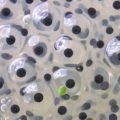Season of Disbelief

The thing about the children happened in the middle of summer. Mrs. Bentley, coming out to water the ivy upon her front porch, saw two cool-colored sprawling girls and a small boy lying on her lawn, enjoying the immense prickling of the grass.
At the very moment Mrs. Bentley was smiling down upon them with her yellow mask face, around a corner like an elfin band came an ice-cream wagon. It jingled out icy melodies, as crisp and rimmed as crystal wineglasses tapped by an expert, summoning all. The children sat up, turning their heads, like sunflowers after the sun.
Mrs. Bentley called, “Would you like some? Here!” The ice-cream wagon stopped and she exchanged money for pieces of the original Ice Age. The children thanked her with snow in their mouths, their eyes darting from her buttoned-up shoes to her white hair.
“Don’t you want a bite?” said the boy.
“No, child. I’m old enough and cold enough; the hottest day won’t thaw me,” laughed Mrs. Bentley.
They carried the miniature glaciers up and sat, three in a row, on the shady porch glider.
“I’m Alice, she’s Jane, and that’s Tom Spaulding.”
“How nice. And I’m Mrs. Bentley. They called me Helen.”
They stared at her.
“Don’t you believe they called me Helen?” said the old lady.
“I didn’t know old ladies had first names,” said Tom, blinking.
Mrs. Bentley laughed dryly.
“You never hear them used, he means,” said Jane.
“My dear, when you are as old as I, they won’t call you Jane, either. Old age is dreadfully formal. It’s always ‘Mrs. ‘ Young People don’t like to call you ‘Helen. ‘ It seems much too flip.”
“How old are you?” asked Alice.
“I remember the pterodactyl.” Mrs. Bentley smiled.
“No, but how old?”
“Seventy-two . “
They gave their cold sweets an extra long suck, deliberating.
“That’s old,” said Tom.
“I don’t feel any different now than when I was your age,” said the old lady .
“Our age?”
“Yes. Once I was a pretty little girl just like you, Jane, and you, Alice.” They did not speak. “What’s the matter?”
“Nothing.” Jane got up.
“Oh, you don’t have to go so soon, I hope. You haven’t finished eating… Is something the matter? “
“My mother says it isn’t nice to fib,” said Jane.
“Of course it isn’t. It’s very bad,” agreed Mrs. Bentley.
“And not to listen to fibs.”
“Who was fibbing to you, Jane?”
Jane looked at her and then glanced nervously away. “You were.”
“I?” Mrs. Bentley laughed and put her withered claw to her small bosom. “About what?”
“About your age. About being a little girl.”
Mrs. Bentley stiffened. “But I was, many years ago, a little girl just like you.”
“Come on, Alice, Tom.”
“Just a moment,” said Mrs. Bentley. “Don’t you believe me?”
“I don’t know,” said Jane. “No.”
“But how ridiculous! It’s perfectly obvious. Everyone was young once!”
“Not you,” whispered Jane, eyes down, almost to herself. Her empty ice stick had fallen in a vanilla puddle on the porch floor.
“But of course I was eight, nine, ten years old, like all of you.”
The two girls gave a short, quickly-sealed-up laugh.
Mrs . Bentley’s eyes glittered . “Well, I can’t waste a morning arguing with ten-year-olds. Needless to say, I was ten myself once and just as silly.”
The two girls laughed. Tom looked uneasy.
“You’re joking with us, ” giggled Jane. “You weren’t really ten ever, were you, Mrs. Bentley?”
“You run on home!” the woman cried suddenly, for she could not stand their eyes . ” I won’t have you laughing.”
“And your name’s not really Helen?”
“Of course it’s Helen!”
“Good-bye,” said the two girls, giggling away across the lawn under the seas of shade, Tom followed them slowly.
“Thanks for the ice cream!”
“Once I played hopscotch!” Mrs. Bentley cried after them, but they were gone .







